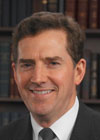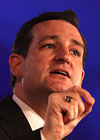Right now across the country, Tea Party leaders and strategists are working furiously to establish a major beachhead in the Senate next January. Combined with at least half a dozen sitting senators who already have strong Tea Party ties – including Rand Paul of Kentucky, Pat Toomey of Pennsylvania, Mike Lee of Utah and Ron Johnson of Wisconsin – some ambitious newcomers could put tremendous pressure on Republican Leader Mitch McConnell of Kentucky to advance the conservative agenda they stand for, including a balanced budget, smaller government, entitlement and tax reform, and the repeal of President Obama’s signature health care reforms.
RELATED: Tea Party Republicans Plan a Senate Coup in November
Wisconsin Senate candidate Mark Neumann, already endorsed by the Tea Party Express – one of the largest Tea Party groups – is among those hoping to take the Capitol by storm this fall. “It may very well be the first time in more than a generation that the Republican caucus might be in control in the Senate,” Neumann told The Fiscal Times on Tuesday as he began a multi-city Tea Party Express bus tour in La Crosse, Wisconsin.
Here are snapshots of six senators already closely allied with the Tea Party – and three who would like to join them in Washington, D.C., this fall:
6 Senators Strongly Allied with the Tea Party
Jim DeMint of South Carolina
 One of the Senate’s most conservative members, DeMint, 60, favors a balanced-budget amendment and strongly opposes Obamacare, the bank and auto bailouts, and spending increases by the federal government. Last month he turned his political action committee, the Senate Conservatives Fund, into an independent PAC, allowing it to raise limitless funds for GOP Senate candidates. “If we’re going to save this country, we have to elect more conservatives to the U.S. Senate,” DeMint maintains.
One of the Senate’s most conservative members, DeMint, 60, favors a balanced-budget amendment and strongly opposes Obamacare, the bank and auto bailouts, and spending increases by the federal government. Last month he turned his political action committee, the Senate Conservatives Fund, into an independent PAC, allowing it to raise limitless funds for GOP Senate candidates. “If we’re going to save this country, we have to elect more conservatives to the U.S. Senate,” DeMint maintains.
Ron Johnson of Wisconsin A businessman first elected in 2010, Johnson also believes in balancing the budget and in hard caps on federal spending. The nation’s fiscal situation is “dire,” says Johnson, who argues that “the number-one problem facing our nation” is the “mountain of debt that threatens the hopes and dreams of future generations.” Large deficits, sluggish economic activity, high unemployment and “woefully inadequate job creation,” says Johnson, are symptoms of the debt problem – and he blames the size, scope and cost of government for all of it.
A businessman first elected in 2010, Johnson also believes in balancing the budget and in hard caps on federal spending. The nation’s fiscal situation is “dire,” says Johnson, who argues that “the number-one problem facing our nation” is the “mountain of debt that threatens the hopes and dreams of future generations.” Large deficits, sluggish economic activity, high unemployment and “woefully inadequate job creation,” says Johnson, are symptoms of the debt problem – and he blames the size, scope and cost of government for all of it.
Mike Lee of Utah
 Just 41, Lee, an attorney, clerked for Judge Samuel Alito before Alito joined the High Court. Like Johnson, Lee also entered the Senate in January 2011, winning election easily with 62 percent of the vote. Lee earned a perfect score of 100 last year from the Club for Growth, the politically conservative organization whose agenda includes free trade, lower taxes, smaller government, and less government spending. The group has bestowed this mantle on only four other U.S. senators: Jim DeMint, Ron Johnson, Rand Paul, and Tom Coburn. Lee is a member of the Church of Latter-Day Saints.
Just 41, Lee, an attorney, clerked for Judge Samuel Alito before Alito joined the High Court. Like Johnson, Lee also entered the Senate in January 2011, winning election easily with 62 percent of the vote. Lee earned a perfect score of 100 last year from the Club for Growth, the politically conservative organization whose agenda includes free trade, lower taxes, smaller government, and less government spending. The group has bestowed this mantle on only four other U.S. senators: Jim DeMint, Ron Johnson, Rand Paul, and Tom Coburn. Lee is a member of the Church of Latter-Day Saints.
Rand Paul of Kentucky
 Paul, 49, an ophthalmologist and a son of Ron Paul, has called for term limits, a balanced budget amendment, reducing federal spending and taxation, and a Read the Bills Act, whose ultimate goal is limiting the size and growth of government. With Jim DeMint and Mike Lee, Paul formed the Senate Tea Party Caucus with the three of them as its inaugural members. Paul’s first legislative proposal was to slash $500 billion from federal spending in one year, including cutting the Dept. of Education by 83 percent and the Homeland Security by 43 percent. He later proposed a five-year plan to balance the budget.
Paul, 49, an ophthalmologist and a son of Ron Paul, has called for term limits, a balanced budget amendment, reducing federal spending and taxation, and a Read the Bills Act, whose ultimate goal is limiting the size and growth of government. With Jim DeMint and Mike Lee, Paul formed the Senate Tea Party Caucus with the three of them as its inaugural members. Paul’s first legislative proposal was to slash $500 billion from federal spending in one year, including cutting the Dept. of Education by 83 percent and the Homeland Security by 43 percent. He later proposed a five-year plan to balance the budget.
Marco Rubio of Florida
 Often mentioned as a VP potential, Rubio, 41, is a darling of Florida’s Cuban community and “very well respected within the [Tea Party] movement, both in Florida and nationally, because his positions appear to be principled and consistent,” Mark Meckler, co-founder of the Tea Party Patriots, told The Fiscal Times. Rubio has called Obama the most “divisive figure in modern American history.” Together with Sen. Jerry Moran (R-Kansas), Rubio created legislation known as the Startup Act 2.0, intended to jumpstart the economy through growth and entrepreneurship.
Often mentioned as a VP potential, Rubio, 41, is a darling of Florida’s Cuban community and “very well respected within the [Tea Party] movement, both in Florida and nationally, because his positions appear to be principled and consistent,” Mark Meckler, co-founder of the Tea Party Patriots, told The Fiscal Times. Rubio has called Obama the most “divisive figure in modern American history.” Together with Sen. Jerry Moran (R-Kansas), Rubio created legislation known as the Startup Act 2.0, intended to jumpstart the economy through growth and entrepreneurship.
Pat Toomey of Pennsylvania
 A former businessman who also served as president of the conservative Club for Growth, Toomey, 50, has consistently argued for reducing and cutting taxes, has advocated for deregulating the financial services industry, and was against the 2009 federal stimulus package. Before election to the Senate he served in the House, representing Pennsylvania’s 15th congressional district for six years, where he distinguished himself as a fiscal expert. In April of this year, Toomey was selected to succeed DeMint as chairman of the Senate Steering Committee, a caucus for legislative collaboration.
A former businessman who also served as president of the conservative Club for Growth, Toomey, 50, has consistently argued for reducing and cutting taxes, has advocated for deregulating the financial services industry, and was against the 2009 federal stimulus package. Before election to the Senate he served in the House, representing Pennsylvania’s 15th congressional district for six years, where he distinguished himself as a fiscal expert. In April of this year, Toomey was selected to succeed DeMint as chairman of the Senate Steering Committee, a caucus for legislative collaboration.
And 3 Who May Be Shoo-Ins This Year
Ted Cruz of Texas
 The Harvard-educated lawyer and former solicitor general of Texas is a dream candidate for the Tea Party: He combines strong conservative principles of limited government and fiscal frugality with a dazzling resume. Cruz, 41, is a Cuban-American and family man who has argued cases before the Supreme Court but never before run for office. He came from nowhere to defeat Lt. Gov. David Dewhurst – the frontrunner who enjoyed the backing of Gov. Rick Perry – in a July 31 runoff for the all-important GOP nomination to succeed retiring Sen. Kay Bailey Hutchison, R-Tex.
The Harvard-educated lawyer and former solicitor general of Texas is a dream candidate for the Tea Party: He combines strong conservative principles of limited government and fiscal frugality with a dazzling resume. Cruz, 41, is a Cuban-American and family man who has argued cases before the Supreme Court but never before run for office. He came from nowhere to defeat Lt. Gov. David Dewhurst – the frontrunner who enjoyed the backing of Gov. Rick Perry – in a July 31 runoff for the all-important GOP nomination to succeed retiring Sen. Kay Bailey Hutchison, R-Tex.
Richard Mourdock of Indiana  The State Treasurer of Indiana and one-time chief geologist for Standard Oil defeated veteran Republican Sen. Richard Lugar in the GOP Senate primary on May 8, blasting the highly regarded Lugar for working too closely with Democrats and for losing touch with his home state. Mourdock, 60, has called for cuts in federal spending and a balanced budget, and said he would have opposed the bailout of General Motors and Chrysler. He has described himself as uncompromising, saying that bipartisanship “means they [the Democrats] have to come our way.”
The State Treasurer of Indiana and one-time chief geologist for Standard Oil defeated veteran Republican Sen. Richard Lugar in the GOP Senate primary on May 8, blasting the highly regarded Lugar for working too closely with Democrats and for losing touch with his home state. Mourdock, 60, has called for cuts in federal spending and a balanced budget, and said he would have opposed the bailout of General Motors and Chrysler. He has described himself as uncompromising, saying that bipartisanship “means they [the Democrats] have to come our way.”
Deb Fischer of Nebraska The two-term state senator and radio personality surged to victory in May in the Republican primary to replace retiring Sen. Ben Nelson, D-Neb., thanks to last-minute help from a conservative Super PAC that financed $250,000 of negative ads against one of her two better-known opponents. Fischer, 61, was criticized by environmentalists because her family's ranch grazes cattle on federal land and leases it for about $110,000 a year less than the market rate on private land. Heading into the general election campaign, she holds a comfortable lead over Democrat Bob Kerrey, the former senator and governor branded a “carpetbagger” by Republicans.
The two-term state senator and radio personality surged to victory in May in the Republican primary to replace retiring Sen. Ben Nelson, D-Neb., thanks to last-minute help from a conservative Super PAC that financed $250,000 of negative ads against one of her two better-known opponents. Fischer, 61, was criticized by environmentalists because her family's ranch grazes cattle on federal land and leases it for about $110,000 a year less than the market rate on private land. Heading into the general election campaign, she holds a comfortable lead over Democrat Bob Kerrey, the former senator and governor branded a “carpetbagger” by Republicans.






